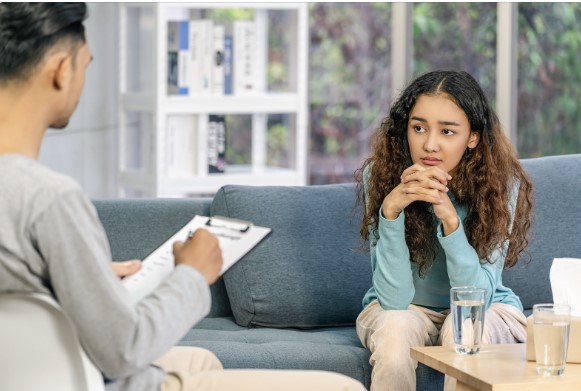 If you feel anxious or afraid in certain situations, you might be struggling with a phobia. A phobia is an intense fear of something that causes anxiety and usually leads to avoidance of the feared object or situation. It’s normal to occasionally have feelings of fear or anxiety, but when it starts impacting daily activities it can significantly interfere with a person’s life. Do you think you may have a phobia? If so, this blog post is here to help guide your journey towards understanding more about phobias and how to cope with them.
If you feel anxious or afraid in certain situations, you might be struggling with a phobia. A phobia is an intense fear of something that causes anxiety and usually leads to avoidance of the feared object or situation. It’s normal to occasionally have feelings of fear or anxiety, but when it starts impacting daily activities it can significantly interfere with a person’s life. Do you think you may have a phobia? If so, this blog post is here to help guide your journey towards understanding more about phobias and how to cope with them.
The Symptoms of a Phobia
Have you ever experienced intense fear or anxiety from a certain object or situation? This overwhelming reaction could be a sign of a phobia. Phobias are common and can greatly impact a person’s daily life. Some common symptoms of a phobia include rapid heart rate, trembling, sweating, nausea, and difficulty breathing. However, the severity and symptoms of a phobia can vary from person to person. It is important to understand and recognize these symptoms in order to seek proper treatment and support. Don’t let your phobia control your life – click here to reach out to a healthcare professional for help in managing your fears.
Identify the Fearful Situation or Object
Fear is a natural emotional response that all humans experience. There are various situations and objects that can trigger fear within individuals, whether it be a fear of heights, spiders, or even public speaking. The human brain is wired to detect potential dangers in our surroundings, and when faced with something that causes fear, our fight or flight response kicks in. It’s important to remember that fear is not always a bad thing, as it can help protect us from harm. However, when fear becomes debilitating and starts to interfere with daily life, it may be necessary to seek professional help to overcome it. It’s important to face our fears and not let them control us.
Learn About Your Anxiety Triggers
Anxiety can be an overwhelming sensation that can impact various aspects of your life. Knowing what triggers your anxiety can be helpful in learning how to manage it. Triggers can be different for everyone, and it’s important to identify your personal triggers to help avoid or cope with them along the way. Some common triggers include stress, certain social situations, and particular sensory stimuli. By understanding your triggers, you can become more aware of the situations or circumstances that may cause your anxiety to worsen. This knowledge can lead to new coping strategies and help you feel more in control of your mental health.
Determine if it is Caused By Other Factors
When faced with a problem, it is important to investigate potential causes beyond what appears to be the obvious source. This is especially true when trying to determine the root of a particularly challenging issue. It is crucial to consider whether or not there are additional factors at play that could be contributing to the problem. By identifying and addressing these underlying causes, individuals can often find more effective solutions and prevent the issue from recurring in the future. It may take some extra effort and investigation, but taking the time to consider all possible factors can ultimately lead to a quicker and more successful resolution.
See a Professional for Evaluation and Treatment Options
When it comes to evaluating your mental health, seeking professional help is always the smart choice. Mental wellbeing is just as important as physical health, and ignoring potential issues can lead to serious consequences down the line. Seeing a therapist or psychiatrist may seem intimidating, but it’s crucial to remember that they are trained to help you navigate any challenges you may be facing. Whether you’re struggling with anxiety, depression, or another mental health issue, a professional can assess your symptoms and provide a personalized treatment plan. Don’t hesitate to reach out for help – taking that first step can make a world of difference.
Seek Support from Friends and Family
At some point in life, we all need help and support from our loved ones. Whether it’s dealing with a personal crisis or simply needing a sounding board for our thoughts and ideas, seeking support from friends and family can make all the difference. Our loved ones know us best and can provide us with the empathy and encouragement we need to navigate life’s challenges. While it can be difficult to ask for help, it’s important to remember that we are not alone and that there is no shame in seeking support. Building a strong support system can help us grow and thrive in all aspects of our lives. So reach out to those you trust and let yourself be supported.
While it is natural to feel anxiety due to known or unknown fear situations, the key is to understand the underlying cause of a phobia and how it can best be addressed. Developing self-awareness about potential triggers to your own phobia and then utilizing resources such as seeking support from family and friends, as well as exploring therapy sessions with an experienced certification counselor can help you better cope with your feelings and experience a healthier life. Knowing more about phobias can empower you to find new solutions within yourself, allowing for deeper insights into your issue so that it no longer controls your life. Everyone should have access to tools that will guide them in understanding their unique set of triggers and dealing with their daunting fears in order to find solace within themselves.
